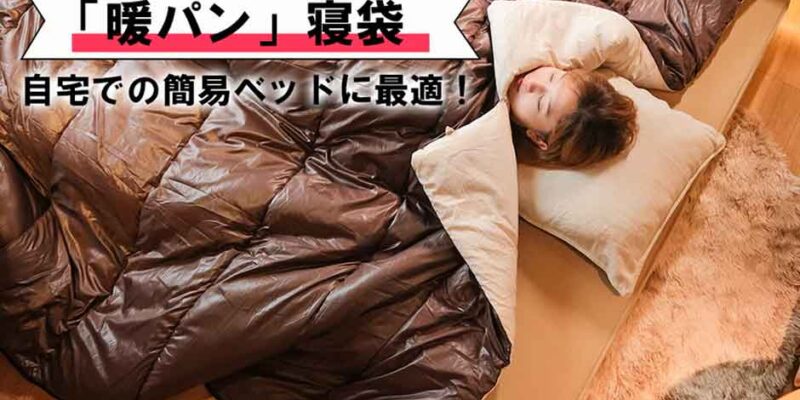In Japan, where living spaces are often compact, households must be creative when it comes to accommodating overnight guests. Traditionally, the futon has been the bedding of choice in Japanese homes. However, in recent years, sleeping bags have become a popular alternative—not just for camping, but also for home hospitality.
So which is better when hosting friends or family in tight spaces? Both sleeping bags and futons have their strengths, but the right choice often depends on your household’s priorities. Let’s take a closer look at how these two bedding options compare.
The Space Factor: Compact Living in Japan
Japan is well known for its compact apartments and houses, particularly in large cities. Storage space is often limited, which makes bulky furniture and bedding difficult to manage.
Futons: Futons are foldable and traditionally stored in a closet during the day. While convenient, they still require considerable storage space, especially if you own several sets for guests.
Sleeping Bags: シュラフ compress into compact rolls or storage bags. They can easily fit under a bed, inside a closet, or even in a small storage box. For households with very limited space, this makes sleeping bags an attractive option.
When space is the top priority, sleeping bags clearly offer an edge.
Comfort: Traditional Futons vs. Modern Sleeping Bags
Comfort is one of the biggest factors when hosting overnight guests.
Futons: A futon provides a flat, cushioned surface, which many guests may find similar to a thin mattress. For those used to sleeping on beds, futons can feel more familiar. They also work well on tatami mats, blending seamlessly with Japanese home interiors.
Sleeping Bags: Modern sleeping bags are surprisingly comfortable. Many are padded and insulated, offering warmth and softness. When paired with a simple mat or carpet underneath, they can provide nearly the same level of comfort as a futon.
If comfort is your top concern and you have sufficient storage space, futons may still be the first choice. However, sleeping bags are no longer just for roughing it outdoors—they’ve become much more guest-friendly.
Cost Considerations: Budget-Friendly Solutions
Another important aspect is cost.
Futons: A quality futon set, which usually includes a mattress, duvet, and pillow, can be relatively expensive. If you plan to host multiple guests, the costs add up quickly.
Sleeping Bags: Sleeping bags are generally more affordable. Households can purchase several sleeping bags for the price of one high-quality futon set, making them a cost-effective option for occasional hosting.
For families on a budget, sleeping bags are often the smarter investment.
Ease of Maintenance
Maintaining clean bedding is essential, especially in homes where allergies or dust are concerns.
Futons: Futons require airing out under the sun to stay fresh, and washing them can be difficult due to their bulk and weight. Professional cleaning is sometimes necessary, adding extra cost.
Sleeping Bags: Sleeping bags are often machine washable or come with removable liners. This makes them easier to clean and maintain, which is a major advantage for busy households.
When it comes to hygiene and convenience, sleeping bags have a clear advantage.
Hospitality and Guest Impressions
Beyond practical factors, many hosts worry about how guests will feel.
Futons: Offering a futon has a sense of tradition and formality in Japanese culture. Guests may feel honored and well taken care of when provided with a neatly prepared futon set.
Sleeping Bags: While less traditional, sleeping bags can still be presented neatly, especially when combined with a pillow and blanket. Some guests may even find them fun and unique, especially children or younger visitors.
Choosing between the two may come down to the type of guest. Older relatives might prefer the familiarity of futons, while younger friends or families with kids may enjoy the novelty of sleeping bags.
Seasonal Adaptability
Japan’s four seasons bring different comfort needs.
Futons: Futons are versatile, with options for thicker winter futons and thinner summer futons. However, households often need to own multiple sets for year-round comfort.
Sleeping Bags: Sleeping bags are designed with seasonal adaptability in mind. Lightweight summer versions keep guests cool, while insulated models provide warmth during winter. Some models even feature zippers that allow more airflow.
In terms of seasonal flexibility without needing multiple sets, sleeping bags have the advantage.
Practicality in Emergencies
While the focus here is guest comfort, it’s worth noting that bedding can play an important role in emergencies.
Futons: Futons are not practical to take outside of the home in case of evacuation. Their size and weight make them difficult to transport.
Sleeping Bags: Sleeping bags are lightweight and portable. In case of an earthquake, typhoon, or other natural disaster, they can be quickly packed and carried to a shelter.
This added practicality gives sleeping bags an extra layer of value for Japanese households.
Conclusion: Finding the Right Balance
When comparing sleeping bags and futons for hosting friends and family in compact Japanese homes, there is no one-size-fits-all answer.
Choose futons if comfort, tradition, and guest impression are your top priorities and you have enough storage space.
Choose sleeping bags if you want a space-saving, budget-friendly, easy-to-clean, and versatile option that doubles as キャンプ ギア.
For many modern Japanese households, the best solution may be to keep both: futons for formal guest visits and sleeping bags for casual gatherings or emergencies. By balancing tradition with practicality, you can ensure that every guest feels welcome—no matter the circumstances.

















